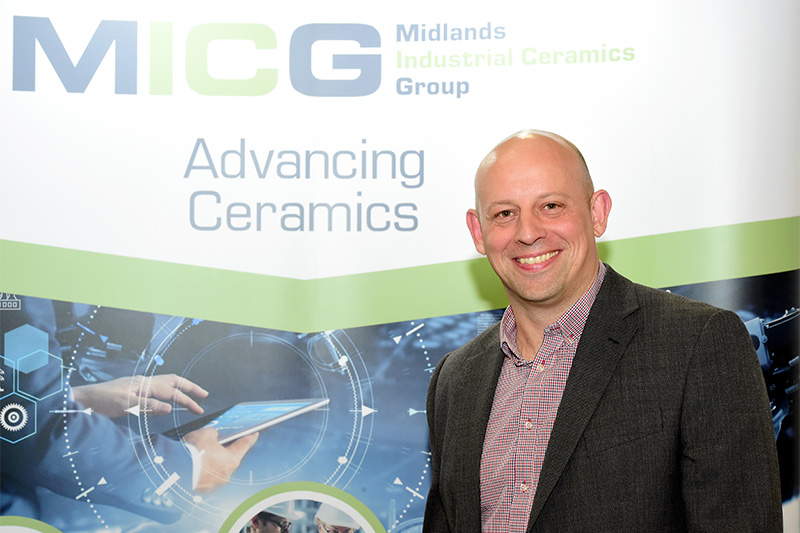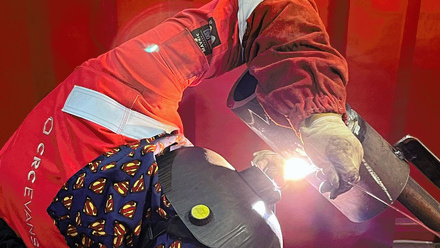Opinion - Ceramics counts
It is one year since the UK Midlands Industrial Ceramics Group secured a significant funding boost. Consortium Chair Ian Edmonds FIMMM of Rolls-Royce updates us on its progress.

The first anniversary of the UK Midlands Industrial Ceramics Group (MICG) was marked by successfully securing £18.27mln of UK Government funding through UK Research and Innovation’s flagship Strength in Places Fund (SIPF). This provides a useful opportunity to review progress and set out plans for the future.
The advanced ceramics sector is projected to be worth £143bln by 2023 globally, and the SIPF funding for a four-year research programme means the Midlands is well-placed to be part of it.
Ceramics are hugely important to the UK to unlock the performance of a wide range of innovative technologies, including energy-efficient jet engines for aerospace, clean energy systems such as fuel cells and batteries, and electronic components for 5G telecommunication. These and many other advanced manufacturing sectors have identified ceramics as the ‘only material that will work’ for vital components, including those needed to operate in extreme conditions.
The ceramics supply chain is also seeking faster, more efficient production techniques with reduced environmental impact, and is exploring digital manufacturing and data analytic techniques to accelerate product development cycles and improve process control.
Bringing together innovation, research, experience and knowledge from both industry and academia across the Midlands, MICG’s membership comprises blue chip companies and SMEs including Rolls-Royce, JCB, Morgan Advanced Materials and Lucideon – as well as the universities of Birmingham, Leicester and Loughborough. Our aims are:
- To make the Midlands the go-to location for the global R&D and production of advanced ceramics.
- Increase the competitiveness of the Midlands industrial base and rapidly grow UK exports of advanced ceramics.
- Solve critical challenges facing the Midlands region in terms of product development for next-generation batteries, 5G electronics and new healthcare devices.
- Enhance industrial ability to develop innovative ceramic technologies with faster scale-up and marketplace adoption.
- Deliver a multi-sectoral approach with rapid translation of new technologies for the advantage of a whole range of industrial sectors.
- Increases in high-skilled jobs and improved education and training opportunities.
MICG is also looking at how advanced ceramics in the Midlands have a key role to play in the shift towards a net-zero carbon future. To achieve this, we have a sub-group that is specifically focused on looking into greener technologies and sustainability.
The MICG also aims to support the competitiveness and success of advanced manufacturing in the Midlands by tackling key innovation challenges, such as creating a unified process for the development and commercialisation of new and enhanced processes and products. One of the key drivers for this is access to small-scale, innovative, manufacturing processes to support research and development.
To achieve this, we have focused on a new, open-access, pilot line for the ceramics industry in north Staffordshire – AMRICC. Consisting of adaptable pilot lines, with end-to-end capability through all the manufacturing steps, it can be configured to meet customers’ needs in terms of the ordering of the processes, as well as the amount of material to be processed in a batch or semi-automated production line.
Key activities include early prototyping and development trials, scale-up and optimisation of new manufacturing processes, and small-scale trials of ‘standard processes’ for productivity and performance improvements. The new facility also supports the production of trial batches. It is operated by expert technicians, scientists and engineers capable of responding exactly to customer specific needs.
The Midlands has a long-established pedigree in ceramics, with excellence and innovation placed front and centre. Advanced ceramics firms here benefit from co-locating with world-class research bodies, access to innovation expertise through the MICG and its partners, and proximity to key manufacturers across a diverse range of industries. A skilled workforce with specialisms in manufacturing and ceramics, and the availability of affordable land and premises, are further benefits.
Cutting-edge technologies developed here have the potential to be world-leading both in terms of revolutionising advanced manufacturing and championing sustainability.
The SIPF funding, combined with partner investment and the creation of new business opportunities, will together make the MICG programme a £42.1mln project. The project could also unlock further investment from MICG’s partners for the Advanced Ceramics Campus – a 130,000 sq ft development, proposed for north Staffordshire. The campus will make the scheme an £80mln-plus project in total, and ultimately contribute towards the creation of 4,200 jobs in the region over the next decade.
We are interested in hearing from anyone involved in researching, using or producing advanced ceramics.
For more information, visit the Consortium.







